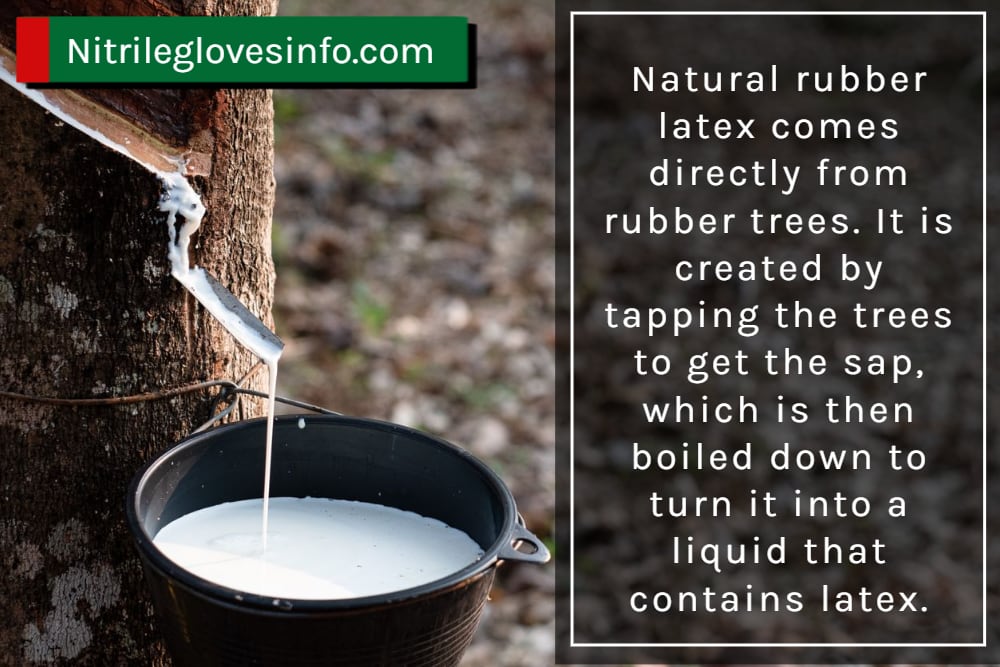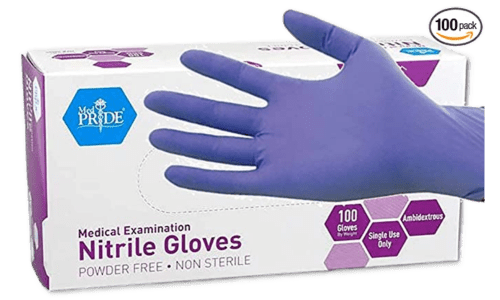What are nitrile?
Nitrile glove material is a type of synthetic rubber. Nitrile gloves are made of a material called NBR, which is made by combining of acrylonitrile-butadiene rubber. The chemical that makes NBR is acrylonitrile, which comes from the monomer butadiene and an acid called acrylic acid or methyl methacrylic chloride (MMA ).
Table of Contents
- What are nitrile?
- What are the Properties of Nitrile?
- What is the Difference Between Natural Material and Synthetic Material?
- What Are Nitrile Gloves?
- What Are Nitrile Gloves Made From?
- Are Nitrile Gloves Latex Free?
- What are Nitrile Gloves Used For?
- What are the Advantages of Nitrile Gloves?
- Superior Puncture Resistance
- High Chemical Resistance:
- Highly Resistant to Petroleum-based Substance
- Dexterity
- High Touch Sensitivity
- MedPride Powder-Free Nitrile Exam Gloves
- Resistant to Chemicals And Also Allergenic Materials
- Mimics the Feel of Latex Gloves.
- Ideal for Handling Infectious Materials
- MedPride Powder-Free Nitrile Exam Gloves
- Long Lasting Durability and Flexible
- Lightweight and Breathable
- Available in Powdered and Powder-free
- Wearable for a Long Time
- Allergen-free, Latex-free, and Protein-free
- What are the Disadvantages of Nitrile Gloves?
- Costs are Often Higher than Vinyl Gloves Making it a More Expensive Option
- Not Biodegradable but This is Changing
- Adhesive Strength is Weak
- When Should You Wear Nitrile Gloves?
- What are Vinyl?
- What are Vinyl Gloves?
- What are Vinyl Gloves Used For?
- What are the Advantages of Vinyl Gloves?
- Cheapest Option Making Them Cost Effective
- Med PRIDE Medical Vinyl Examination Gloves
- Resistant to Water, Oils, and Fats
- Better for Low-risk Tasks and Nnon-hazardous Materials
- Anti-static
- Latex-free, Protein-free, and Allergy-free
- What are the Disadvantages of Vinyl Gloves?
- Less Durable and Flexible Than Nitrile Gloves
- Limited Protection Against Biomedical Exposure
- Susceptible to Puncture and Damage by Cuts
- Not as Chemically Resistant as Nitrile Gloves
- Protective Barrier is Compromised When Stretched
- Low Protection and Puncture Resistant Level
- Loose fit and Less Elasticity
- When Should You Wear Vinyl Gloves?
- How do nitrile gloves differ from vinyl gloves?
- Materials:
- Availability:
- Durability and Puncture Resistance Rating.
- Effectiveness in Manufacturing Processes, Chemical Solutions and Solvents.
- Ease of care, Cleaning and Sanitation.
- Q&A About Nitrile Gloves Vs Vinyl Gloves
- Are there any health risks associated with wearing nitrile or vinyl gloves for a long period of time?
- Vinyl Gloves vs Nitrile Gloves? Which is better?
- Do nitrile and vinyl gloves look the same on the outside, but differ in quality on the inside?
- Nitrile Gloves vs Vinyl Gloves for food: Which one is the best?
- nitrile vs vinyl gloves chemical resistance: Which one is the best?
- latex vs nitrile vs vinyl gloves: Which one is the best?
- Related Posts
What are the Properties of Nitrile?
Nitrile rubber is a kind of polymer that can be used in many industries like automotive, electronics, textile, construction, medical, etc. The properties of nitrile rubber are similar to that of natural rubber. Nitrile rubber is available in different forms like sheet, rod, tubing and film. Nitrile gloves are generally used in the medical field for healthcare workers. It is also used in food processing industry for different kinds of food products.

What is the Difference Between Natural Material and Synthetic Material?
Nitrile gloves are a class of rubber gloves that are nitrile-based. They are a form of synthetic rubber that has been created by a chemical reaction between two chemicals, which is also known as a cross-linking process. Nitrile gloves are a type of synthetic rubber that is a blend of nitric acid and polyisobutylene (PIB). Nitrile gloves have many different types of uses, from general household to industrial use. Whereas natural rubber latex comes directly from rubber trees, nitrile is derived by chemical processes.
What Are Nitrile Gloves?
Disposable Nitrile gloves are made of synthetic rubber, called nitrile. They are not as stretchy or flexible as latex gloves, but they are more durable and resistant to chemicals. They are the best choice for anyone who works with chemicals or who has to handle potentially dangerous substances. Nitrile gloves are also perfect for most medical situations, because they are resistant to punctures and they do not cause allergic reactions.
This means that although you can’t tell if someone is allergic to latex, it’s still a good idea to buy nitrile gloves. If the tattoo artist doesn’t have an allergy to latex, then using nitrile might be safer for him than using latex. For example, even though he may not know if he has an allergy or not, his customers might think about it and thereby discover if their clients need to use nitrile gloves.

What Are Nitrile Gloves Made From?
In gloves made of NBR, there is a material called Nitrile Butadiene Rubber (NBR), which has butadiene and acrylonitrile combined in big vats. Acryliconitrile comes in a volatile form with strong smell. Butadiene gas is a colorless gas that dissolves in water easily.
The gloves and the liquid nitrile react together to form a plastic-like substance that can be shaped by hand or machine once it has been filtered through water and mixed with other components.
Are Nitrile Gloves Latex Free?
Yes , new nitrile gloves are latex free , the only problem was that they initially had a really strong smell but it went away. Moreover, they are a lot more durable than vinyl gloves.
What are Nitrile Gloves Used For?
In recent years nitrile is a popular choice for health care workers because they can use latex free products that protect their hands from disease and infection without fear of allergic reaction or irritation to the skin caused by latex allergy reactions.
Nitrile gloves are medical grade and used for various purposes, which include food handling, beverage industry, pharmaceuticals, agriculture, chemical handling, healthcare and many more. Nitrile gloves are non-latex gloves that are made from nitrile. According to FDA, it is medical-grade and used in the medical industry as it is hypoallergenic and does not contain latex. It is also used in the production of latex gloves to prevent contamination. Nitrile is very flexible and has a good tensile strength.

What are the Advantages of Nitrile Gloves?
Nitrile is naturally resistant to oils so it’s good at protecting things that are covered in oil or other petroleum based chemicals or products used on cars.
Nitrile gloves are better than vinyl ones, including:
Superior Puncture Resistance
Nitrile gloves are the most commonly used type of glove. They are designed to protect the wearer from cuts and punctures. Nitrile gloves are hypoallergenic, non-irritating, and resistant to oils, solvents, and chemicals. These characteristics make them perfect for many applications.
High Chemical Resistance:
Nitrile gloves are known for their high chemical resistance. It has the ability to resist the effects of oils, fuels, solvents, acids, alkalis, and bases. This makes it ideal for medical applications like surgical procedures, food handling, and drug delivery.
Highly Resistant to Petroleum-based Substance
Nitrile gloves are used for a variety of tasks, from healthcare to construction and from food service to industrial work. Nitrile gloves have a high resistance to oils, fats, and petroleum-based products. This means that they can be used with a higher level of comfort and protection for a variety of tasks. They are also resistant to heat, which means that they can be used for more demanding tasks.
Dexterity
Nitrile gloves are widely used in the medical industry. They offer dexterity and comfort because of their smooth texture that do not irritate skin or hands.
High Touch Sensitivity
Nitrile gloves are the most widely used and preferred type of gloves for medical practitioners. Nitrile gloves provide the most high level of touch sensitivity, making them highly suitable for most tasks. It is not just any type of glove, but it is a type of glove that offers the highest level of touch sensitivity and most preferred by medical practitioners. Nitrile gloves are used in a wide range of medical procedures and tasks. They are preferred over other types of gloves because they offer the highest amount of touch sensitivity. When it comes to medical applications, nitrile gloves are the best option because they provide the preferred level of touch sensitivity.
Best Selling Nitrile Gloves on Amazon.com
Resistant to Chemicals And Also Allergenic Materials
Nitrile has a high resistance to chemicals and allergens while also maintaining excellent breathability. It is ideal for food service at restaurants or in kitchens where harmful chemicals may be used on surfaces during preparation or processing.. Nitrile gloves provide excellent resistance to chemicals and allergens as well as maintaining good breathability. They are the best choice for jobs where harmful chemicals, such as oil or toxic solvents, may be used on surfaces during preparation or processing..
Mimics the Feel of Latex Gloves.
Nitrile gloves are synthetic gloves that mimic the fit and feel of latex gloves. Nitrile gloves are typically more expensive than latex gloves, but they are better for sensitive skin. Nitrile gloves are often preferred by people with latex allergies, who may have a difficult time with latex allergies when using latex gloves. Nitrile gloves also offer more comfort than latex gloves, and they are more durable than latex gloves.
Ideal for Handling Infectious Materials
Nitrile gloves are often worn by health care workers in areas where there is a risk of exposure to infectious materials. These gloves are also used in many industrial settings, including meat processing, food preparation, and pharmaceutical manufacturing. Because they are effective at preventing the spread of infectious materials, nitrile gloves are widely used in hospitals and other healthcare facilities. They are also used in some industries, such as agriculture and food processing.
Best Nitrile Gloves
Best Selling Nitrile Gloves on Amazon.com
Long Lasting Durability and Flexible
Nitrile gloves are durable and flexible. Nitrile gloves can be used in extreme conditions and can withstand intense heat and cold. Nitrile gloves are designed to provide the highest level of protection, they provide protection against cuts, scrapes, punctures, abrasions, bites and splinters. Nitrile gloves are also suitable for people with sensitive skin. They also have a long lasting durability and can withstand repeated washing.
Lightweight and Breathable
Nitrile gloves are one of the best ways to protect your hands from dangerous chemicals. These gloves are not only light in weight but also help you to work with chemicals without any damage to your hands. Nitrile gloves are also very durable and strong, which helps you to perform your tasks without any interruption.
Available in Powdered and Powder-free
Nitrile gloves are available in powdered and powder-free varieties. It is important to choose the right type of glove for the type of work you do. For example, powder-free gloves are best for food service jobs because they are better at protecting your hands from chemicals.
Wearable for a Long Time
Nitrile gloves are available in various sizes and can be worn for longer periods of time. These gloves are very easy to wear and they do not get dirty. The high quality of these gloves makes them suitable for various types of work. These gloves can be washed after every use and they do not get damaged.
Allergen-free, Latex-free, and Protein-free
Nitrile gloves are very easy to use, are latex-free, protein-free and allergy-free. Nitrile gloves are generally more comfortable to wear, due to their thinness and lack of tightness. Nitrile gloves are also highly resistant to chemicals, oils, and alkalis. Nitrile gloves are also less expensive than latex gloves.
What are the Disadvantages of Nitrile Gloves?
Nitrile gloves are one of the most common materials used in healthcare. They are soft, flexible, strong and resistant to chemical spills. But they have a couple of major disadvantages as well. Here is a list of those disadvantages.
Costs are Often Higher than Vinyl Gloves Making it a More Expensive Option
Nitrile gloves are more expensive than vinyl gloves, making them a more expensive option. These gloves are not as durable as vinyl and often tear, making them unsuitable for industrial and food service settings.
Not Biodegradable but This is Changing
Nitrile gloves are the most commonly used type of gloves. They are considered safe, reliable and affordable. However, they are not biodegradable. When you wear nitrile gloves, you are exposing yourself to chemicals that can cause cancer and other health problems. Also, they are not comfortable to wear. Nitrile gloves are not the best choice for every job.
Adhesive Strength is Weak
The adhesives used in nitrate gloves are weaker than most other types of vinyl gloves. Adhesion to skin may be a problem with certain jobs, because the metal rings or hooks within these type of gloves can cause problems if you grab something too hard.
When Should You Wear Nitrile Gloves?
Nitrile gloves are the best choice when you need to handle harsh chemicals or chemicals that can damage your skin. They are extremely safe and prevent the transmission of infections and diseases. They are used in food processing, pharmaceuticals, health care, and cleaning industries. Nitrile gloves are also preferred over vinyl gloves because they provide more protection against harmful substances. Nitrile gloves are also preferred over vinyl gloves because they provide more protection against harmful substances.

What are Vinyl?
Vinyl stands for polyvinyl chloride (note: there is no hyphen in the word “vinyl”). It is a plastic material that is used in a whole bunch of products. It can be used to make clothing, home and office supplies, and hundreds of other products. It is made by combining vinyl chloride and ethylene, and it is then used in a variety of applications.
Vinyl is a polymer material used in many applications including clothing, shoes, flooring, toys, etc. Polymer materials can be molded into various shapes such as plastic sheets, tubes, films, fibers, foams, gaskets, and other products. They have excellent chemical resistance and heat stability. In addition, they do not absorb moisture like rubber does.
What are Vinyl Gloves?
Gloves made from polyvinyl chloride, or PVC, are petroleum-based. It’s by far the biggest advantage of vinyl disposable gloves that they’re cheap and easy to make. However, they don’t protect against chemicals and biomedical agents as well as nitrile. Whenever vinyl gloves are stretched or flexed, the barrier that protects them breaks down. The protective barrier breaks down after the molecule breaks down.
Nitrile are more durable, but vinyl gloves still work well when toughness and durability are less important than simply being able to protect against contamination.
They are good for doing things like cleaning the bathroom because they are thin and fit your hands well. When you use them, they can get holes in them and they don’t fit your hands as well. They are not good for things like when you are sick or when you are doing something that might make you sick.
Vinyl gloves are bad for the environment because they are made of plastic. Plastic is bad for the environment because it doesn’t go away. When you use vinyl gloves, you are using plastic. Plastic doesn’t go away. Plastic is bad for the environment because it doesn’t go away.

What are Vinyl Gloves Used For?
Vinyl gloves are used for delicate work. These products are used in non-dangerous situations and low risk environments because they don’t offer much protection. They can be used in many different industries such as chemical manufacturing, automotive repair, electronics assembly, construction, plumbing, painting, welding, etc.
What are the Advantages of Vinyl Gloves?
Vinyl gloves are one of the easiest ways to protect yourself from germs and bacteria. But do you know the other advantages of using vinyl gloves? These include:
Cheapest Option Making Them Cost Effective
Vinyl gloves are the cheapest option when it comes to disposable gloves. They are cheaper than latex, nitrile and vinyl free products, due to their cost effective nature. This is because these products are manufactured in large quantities, which reduces the cost of production. Moreover, they are also made from a cheaper material, which reduces the cost of production.
Best Selling Vinyle Gloves on Amazon.com
Resistant to Water, Oils, and Fats
Vinyl gloves are good for handling hot and cold liquids, oils, and fats. These types of gloves are also great for handling a variety of other materials. They are resistant to water, oils, and fats.
Better for Low-risk Tasks and Nnon-hazardous Materials
Due to the fact that vinyl gloves provide better protection than latex gloves, they are best for low-risk tasks and non-hazardous materials. For tasks where there is the potential for exposure to hazardous materials like chemicals, vinyl gloves are not suitable because they can be permeated by these substances and cause severe damage to the wearer.
Anti-static
Vinyl gloves are used in many industries to protect hands from hazardous static electricity. When static electricity is generated, it can cause burns and electrical shocks. Vinyl gloves have many benefits, including their anti-static properties. They are not only used for protecting hands from static electricity, but also help protect the wearer from harmful chemicals that may be present in the workplace.
Latex-free, Protein-free, and Allergy-free
Vinyl gloves are a better alternative to latex and other common materials that can cause allergic reactions. Latex is a common allergen that can cause a severe allergic reaction in some people. Vinyl gloves are made from vinyl chloride, which is a synthetic polymer. They do not contain latex or any other substances that can be allergic.
What are the Disadvantages of Vinyl Gloves?
Vinyl gloves are used in many industries, especially those where contamination is a concern. However, there are some disadvantages of wearing these gloves that people should be aware of.
Less Durable and Flexible Than Nitrile Gloves
Vinyl gloves are less durable because they are made of vinyl and hence not as durable as nitrile gloves. Nitrile gloves are better than vinyl gloves because they are more durable and flexible. Also, they do not easily get torn. Nitrile gloves offer better protection against irritation and infection than vinyl gloves.
Limited Protection Against Biomedical Exposure
Vinyl gloves offer limited protection against biomedical exposure because they are not completely impermeable to the fluids that are used in medical procedures. They are also prone to tears, punctures, and wear-and-tear.
Susceptible to Puncture and Damage by Cuts
Vinyl gloves are designed to provide better protection against puncture and damage by cuts. However, vinyl gloves are also more susceptible to puncture and damage by cuts than other types of gloves. There are several factors that make vinyl gloves susceptible to puncture and damage by cuts. One of the main factors is the stiffness of the material used in the construction of the glove. If the material is not flexible enough, it will cause more pressure on the fingers while wearing it. This can lead to damaged skin, soreness in the skin, and irritation.
Not as Chemically Resistant as Nitrile Gloves
Vinyl gloves are very cheap in price, but they are not as chemically resistant as nitrile gloves. Nitrile gloves have better abrasion resistance and chemical resistance. Nitrile gloves can also be used for a longer period of time. Moreover, they are also better than vinyl gloves in terms of chemical resistance.
Protective Barrier is Compromised When Stretched
Vinyl gloves are a great choice for handling hazardous chemicals and providing a protective barrier. However, they can stretch and lose their ability to protect. This is because the vinyl is made of a stretchy material that is designed to be flexible. When stretched, it loses its ability to be as protective as it should be. In addition, there are many situations where the vinyl is not the best choice for protecting you from contamination.
Low Protection and Puncture Resistant Level
Vinyl gloves are low protection gloves. They don’t offer the same level of protection as latex or nitrile gloves. These types of gloves are usually made from polyvinyl chloride (PVC), which can be highly toxic to skin. Vinyl gloves are also often used for tasks that don’t require the same level of protection, like gardening or painting.
Loose fit and Less Elasticity
The main disadvantage of vinyl gloves is that they are loose fit and less elastic. As they are not made of rubber, they are not as effective as latex gloves. They do not provide protection against harmful bacteria like latex gloves do. Another disadvantage is that they are not very durable. They can get damaged very easily and you will have to buy new ones after every few uses.
When Should You Wear Vinyl Gloves?
A person can wear nitrile gloves for a number of reasons. When you are at home, you can wear them to protect your hands from dirt and germs. When you are working in the kitchen, you can wear them to protect your hands from chemicals and oils. Vinyl gloves are less expensive than nitrile gloves. However, they are not as strong as nitrile gloves.
How do nitrile gloves differ from vinyl gloves?
Materials:
The difference between nitrile and vinyl gloves is the materials used in making them. Nitrile comes from synthetic rubber. On the other hand, PVC makes up most of vinyl’s composition.
Availability:
Nitrile gloves are a type of rubber glove that has a smooth surface and is used in a variety of applications. They are often used in medical settings, as well as in the food industry. Nitrile gloves are also often used in agriculture, as they can be washed easily and will not cause allergic reactions. Vinyl gloves are a type of rubber glove that is made from vinyl. They have a rough surface and are often used in manufacturing, construction, and other industries.
Durability and Puncture Resistance Rating.
Nitrile gloves are more puncture resistant than vinyl gloves. The reason is that nitrile is a synthetic rubber, while vinyl is a natural rubber. Nitrile has more than one hundred times the tensile strength of vinyl. Nitrile gloves are more durable than vinyl gloves. They also provide better grip and last longer.
Effectiveness in Manufacturing Processes, Chemical Solutions and Solvents.
Nitrile gloves are more expensive than vinyl gloves, but they are more effective in manufacturing processes, chemical solutions and solvents. Vinyl gloves can be stretched and damaged easily, which can lead to cuts and infections. Nitrile gloves are more durable, so they do not need to be replaced as often. Vinyl gloves are also thinner than nitrile gloves, which make them less protective. Nitrile gloves offer a better fit for many people, because they are easier to put on and maintain.
Ease of care, Cleaning and Sanitation.
Nitrile gloves are often more user friendly than vinyl gloves as they can be cleaned easily with water or soap solution (contrary to some people believe that nitrile does not clean like natural rubber once worn). They also offer a better protection against dirt and other elements.
Q&A About Nitrile Gloves Vs Vinyl Gloves
Are there any health risks associated with wearing nitrile or vinyl gloves for a long period of time?
Nitrile gloves are generally more expensive than vinyl gloves. Nitrile gloves have been known to have less permeability and also have a higher tensile strength. Nitrile gloves are also more resistant to moisture, chemicals, and oil. They are generally safer for the wearer and easier to handle than vinyl gloves.
Vinyl Gloves vs Nitrile Gloves? Which is better?
Nitrile Gloves vs Vinyl : Which is better? Nitrile and vinyl gloves are very different from each other. Nitrile gloves are generally considered to be more expensive than vinyl gloves. Vinyl gloves, on the other hand, are more widely used in the industry and in the home. They are cheaper than nitrile gloves and they can be easily washed and disinfected. However, nitrile gloves offer better protection against oils, acids, and certain chemicals.
Nitrile gloves are a popular choice for workers in healthcare, food preparation, and manufacturing industries. They have superior chemical resistance, making them a great choice for many applications. In fact, they are the only kind of gloves that can be used when working with acid-based chemicals. However, they can be more expensive than vinyl gloves.
Do nitrile and vinyl gloves look the same on the outside, but differ in quality on the inside?
Nitrile gloves are more flexible on the outside and better suited for use in the medical field where touch is important, where as vinyl gloves are more durable on the outside and better suited for industrial use.
Vinyl gloves have a higher tensile strength which are popular with people who work with power tools. They are also great for handling chemical substances.
Nitrile Gloves vs Vinyl Gloves for food: Which one is the best?
Nitrile gloves are best for people who work in food and food production. They provide protection from bacteria and chemicals. They also prevent allergies and infections, and they can be used in equipment like microwaves. Vinyl gloves are too thin to offer the same protection as nitrile gloves, but they are easier to put on and take off. find best Nitrile gloves here.
nitrile vs vinyl gloves chemical resistance: Which one is the best?
If you are looking for gloves that will be able to hold up under the harshest weather and chemical conditions, nitrile gloves are the best choice for you. The reason is because they can resist common chemicals and solvents such as chlorine, ammonia and acids.
latex vs nitrile vs vinyl gloves: Which one is the best?
Latex gloves are the most popular type of gloves used in the healthcare industry. Nitrile gloves are thin, flexible, and resistant to chemicals. Vinyl gloves are durable with good tactile sensitivity. The best option is based on what you use them for.








